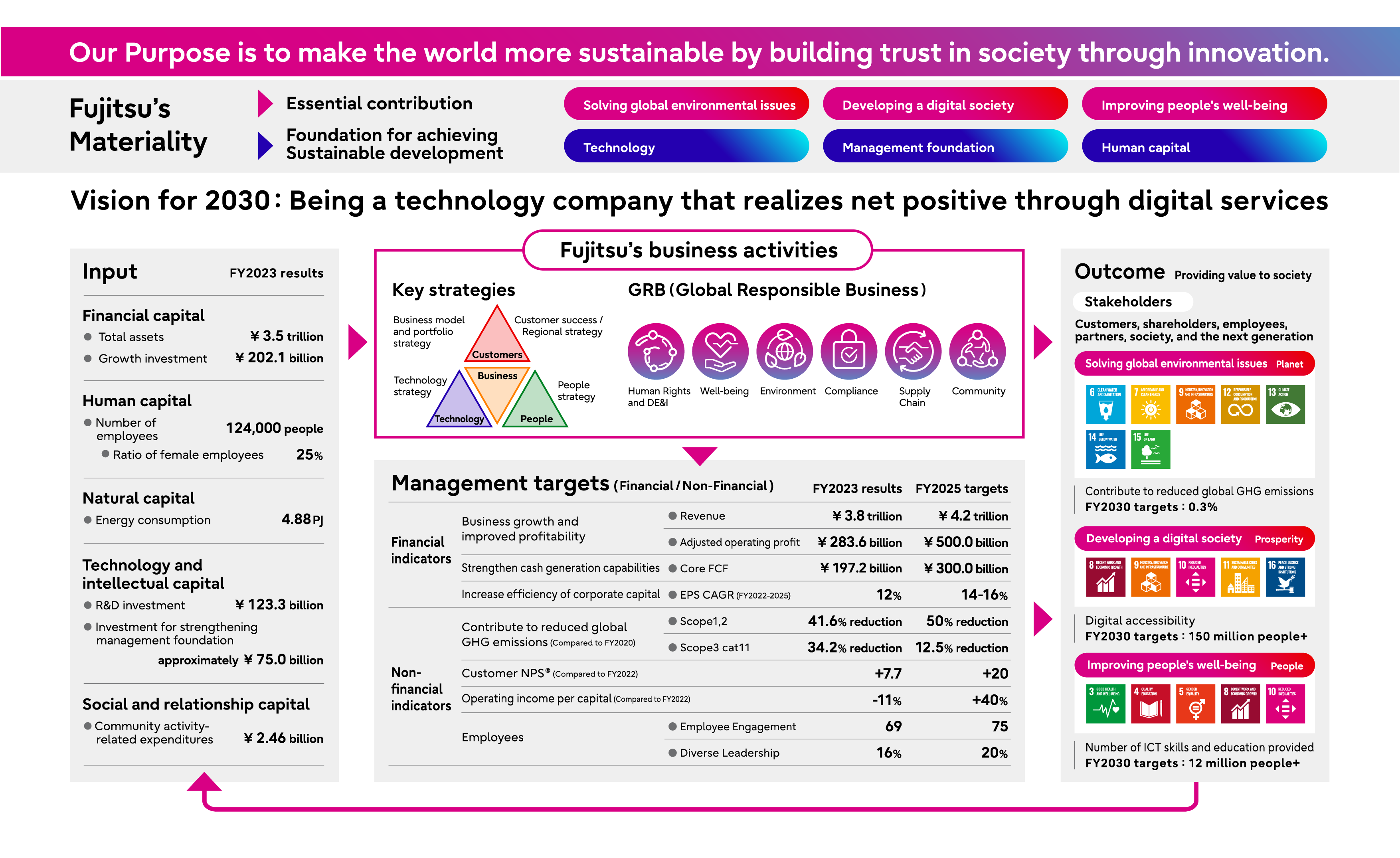-
Sustainability at Fujitsu Group
-
Global Responsible Business
- Environment
-
- Environmental Management
- The Fujitsu Group Environmental Vision on Climate Change
- Living in Harmony with Nature (Conservation of Biodiversity)
- Environmental Action Plan
- Environmental Data
- Environmental Communication
- Environmental Social Activities
- Disposal and Recycling of ICT products
- Environmental Considerations in ICT Products
- Governance
-
Data and Documents
- Fujitsu Group Sustainability Data Book 2023
- Social, Governance and Environmental data
- Independent Assurance Report

- GRI Standards / United Nations Global Compact (UNGC) principles Comparison Table
- SASB Standards Comparison Table
- Sustainability Data Book Framework
- Link to regions responsible business reports
- Contact
- Sitemap
Value Creation Model
Fujitsu's Value Creation Model to Achieve its Purpose
Focused on Societal Challenges Fujitsu is Purpose-Driven to Provide Value to Society
Fujitsu aims to realize its Purpose, which is “to make the world more sustainable by building trust in society through innovation”, and thereby create new value while helping to build a better future for customers and for society.
Reflecting the newly established materiality, our vision for 2030 is to be “a technology company that realizes net positive(*1) through digital services". Our value creation model is based on capital inputs and business activities that aim to create a sustainable society by focusing on key strategies for Fujitsu and to develop the priority issues for sustainability management under the Global Responsible Business (GRB) framework. The outputs derived from these initiatives are positioned as financial and non-financial indicators, and the resulting outcomes provide value to society in the form of impact indicators. We will continue to invest as inputs the various outputs and outcomes generated through these activities, while also working to enhance the value delivered to a range of stakeholders.
- (*1)Fujitsu defines net positive as follows: “In addition to maximizing financial returns, we are committed to solving global environmental problems, developing a digital society, and improving people’s well-being. Technology and innovation will have a positive impact on society as a whole.”
Value Creation Model
 Value Creation Model
Value Creation Model
To achieve outcomes that contribute value to society, Fujitsu is setting targets (impact indicators) for FY2030 for the three materiality themes (Essential Contributions) from the perspective of their impacts on external stakeholders such as customers, society and, in particular, the environment.
To address global environmental issues, it is essential that we work to minimize the environmental impacts among our companies and customers arising from issues such as more frequent natural disasters stricter regulatory regimes and as climate-related problems, particularly global warming, grow worse. By providing solutions and through its various activities, Fujitsu is helping customers and society to reduce their energy consumption, visualize and reduce their greenhouse gas (GHG) emissions, enhance traceability, and bolster their resilience. We have set a specific impact indicator for FY2030 of “aiming for a reduction impact of roughly 0.3% of global total GHG emissions”. This is predicated on reducing our contribution to GHG emissions by the ICT industry, Fujitsu’s target market share and our in-house activities. To this end, we are undertaking monitoring and management to identify our actual GHG reductions using a range of output indicators. These include sales of Fujitsu Uvance solutions activities in our supply chains and within the company, activities by our investment targets, and, which will help us to achieve those indicators.
Regarding the development of a digital society, the economic growth and technological advances that include digitalization can create a more prosperous society, but can also give rise to negative consequences such as greater inequality. However, digitalization is important for society as it offers both prosperity and stability and allows for the creation of a trusted society. By providing solutions and through its various activities, Fujitsu is contributing its customers and the broader society , to independently, freely and autonomously use digital technology to access accurate information. We have set a specific impact indicator for FY2030 of “helping to provide digital accessibility to more than 150 million people” based on future population trends and Fujitsu’s target market share. We are also undertaking monitoring and management using a range of output indicators to identify the actual number of people affected. These output indicators include a count of community activities, the services and solutions offered by sales of Fujitsu Uvance solutions, and our investment targets.
Finally, regarding the improvement of people’s well-being, it is important to provide social value through education and upskilling in order to build human-centric lifestyle platforms that support everyone’s well-being. As well as working positively to provide high-quality education, we also need to offer appropriate assistance in support of measures such as personalized career plans to ensure that we do not exacerbate educational inequality. By providing solutions and through its various activities, Fujitsu is helping customers and society to appropriately improve their ICT skills and acquire ICT expertise. We have set a specific impact indicator for FY2030 of “contributing to the provision of ICT skills and training for at least 12 million people” as the based on future population trends, Fujitsu’s target market share and our delivery rate for ICT skills and training. We are also undertaking monitoring and management using a range of output indicators to identify the actual number of people affected. These output indicators include sales of Fujitsu Uvance solutions, the services and solutions offered by our investment targets, and community events and seminars.


